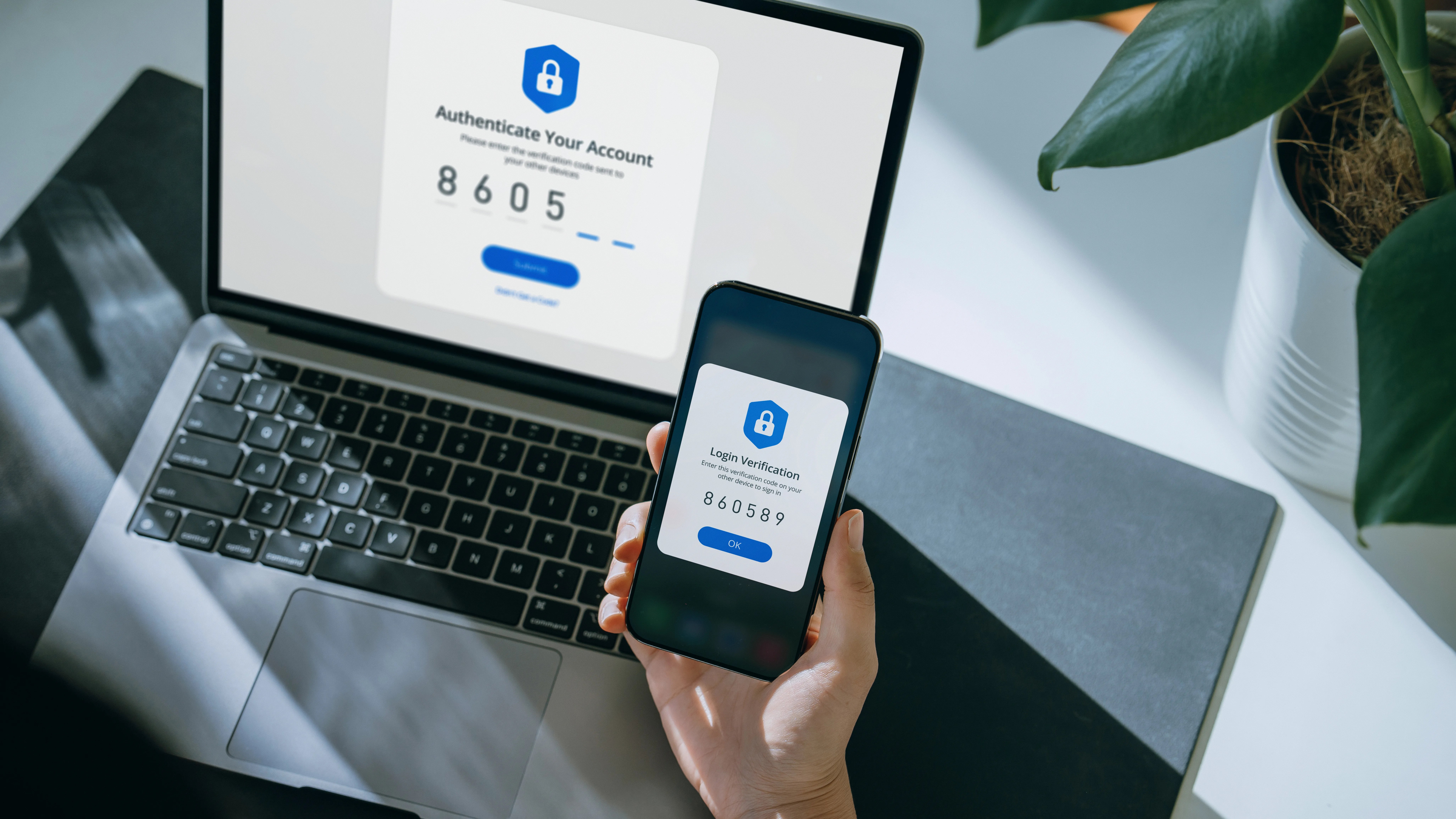
Pew Research Center conducted this study to understand Americans’ knowledge on various digital topics. For this analysis, we surveyed 5,101 U.S. adults from May 15 to May 21, 2023. Everyone who took part in the survey is a member of the Center’s American Trends Panel (ATP), an online survey panel that is recruited through national, random sampling of residential addresses. This way, nearly all U.S. adults have a chance of selection. The survey is weighted to be representative of the U.S. adult population by gender, race, ethnicity, partisan affiliation, education and other categories. Read more about the ATP’s methodology.
Here are the questions used for this report, along with responses, and its methodology.
How does your digital awareness stack up against other Americans?
Test your own knowledge on these questions by taking our interactive quiz.
Digital literacy is widely seen as an essential skill. But Americans’ understanding of digital topics varies notably depending on the subject. For example, majorities of U.S. adults know what cookies on websites do and can identify a secure password. Far fewer can recognize an example of two-factor authentication – a cybersecurity practice that makes signing into online accounts more secure.
In addition, much larger shares know Elon Musk was running Tesla and Twitter in April 2023 than understand the technology behind ChatGPT. (Twitter was recently renamed X in July 2023, after the survey was conducted.)
What is a median?
Throughout this report, median scores are used to help readers see the overall patterns. The median score is the middle number in a list of all scores sorted from highest to lowest.
Overall, Americans answer a median of five out of nine questions correctly on a digital knowledge survey that Pew Research Center conducted among 5,101 U.S. adults from May 15 to May 21, 2023. The questions span a range of topics, including cybersecurity practices, facts about major technology companies, artificial intelligence and federal online privacy laws.
Some 26% of U.S. adults can answer at least seven of the nine questions accurately, but just 4% can correctly answer all nine. And as was the case in past digital knowledge surveys by the Center, the public’s understanding of digital issues differs by age and educational attainment. (Refer to the Appendix for race, ethnicity and gender breaks.)
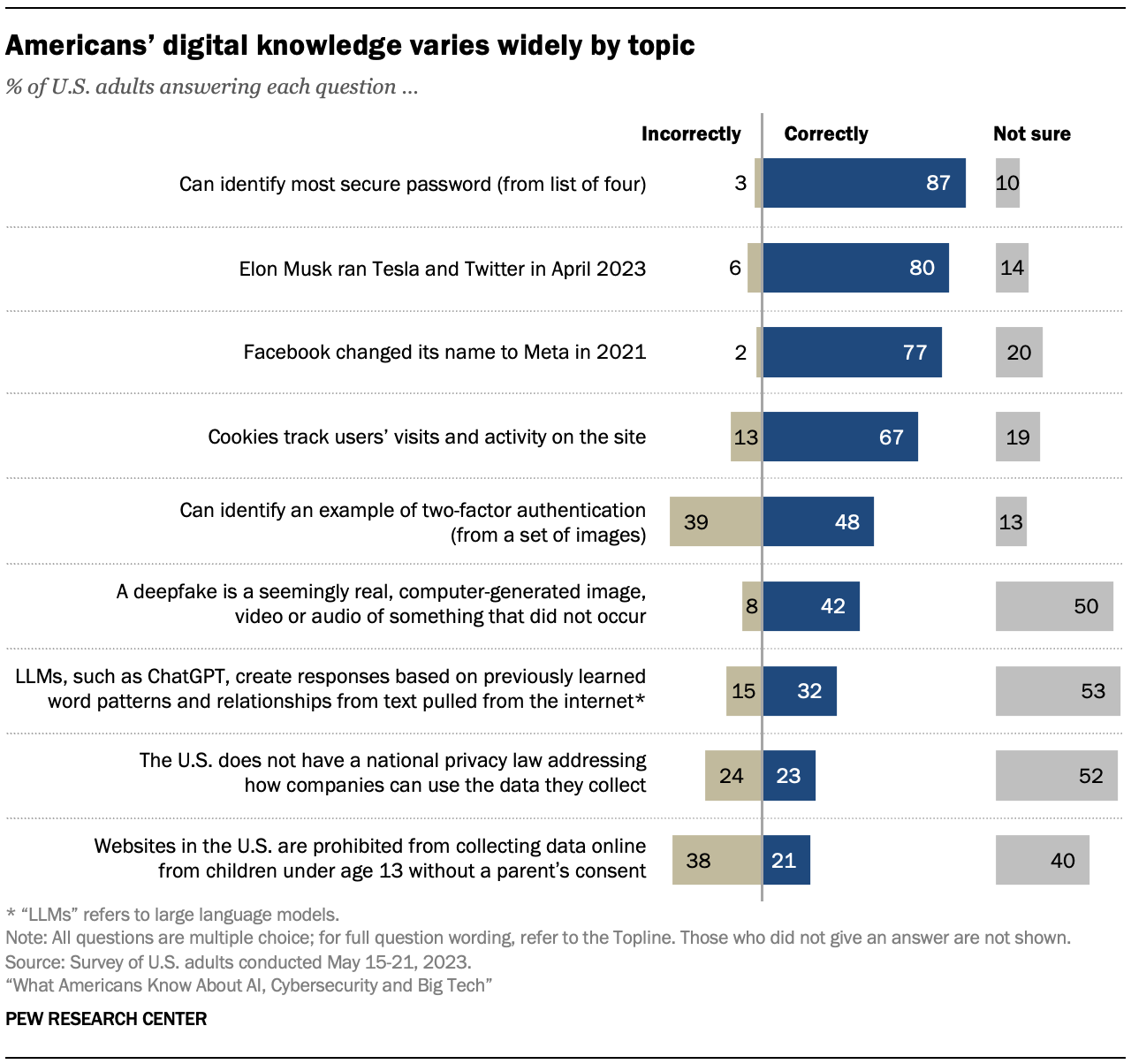
How Americans’ digital knowledge varies by topic
Cybersecurity
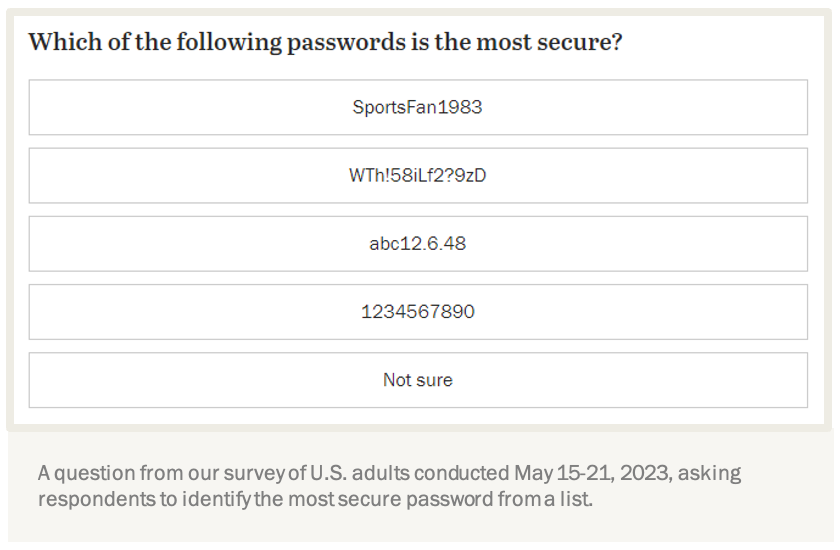
- 87% of U.S adults can correctly identify which password – out of four choices – is the most secure option.
- 67% know that the purpose of cookies is to track visits and activity on a website.
- 48% can correctly identify an example of two-factor authentication from a series of pictures.
Major technology companies
- 80% know Elon Musk was running Tesla and Twitter in April 2023.1
- 77% know Facebook changed its company name to Meta.
Artificial intelligence
- 42% know a deepfake is a seemingly real image, video or audio of something that didn’t occur.
- 32% know large language models, such as ChatGPT, produce answers based on word patterns and relationships they previously learned from text pulled from the internet.
Federal privacy laws
- 23% know the United States lacks a national privacy law that sets common standards for what companies can do with all of the data their products and services collect.
- 21% know websites in the U.S. are prohibited from collecting personal data from minors under 13.
Still, Americans acknowledge they don’t know the answers to some of these questions. When it comes to artificial intelligence, similar shares say they’re not sure how large language models work (53%) or what a deepfake is (50%).
Uncertainty is also common when it comes to privacy laws: 52% of adults aren’t sure if the U.S. has a national online privacy law. And 40% aren’t sure about the age under which minors are protected from websites collecting their data without parental consent.
How Americans’ digital knowledge varies by education level
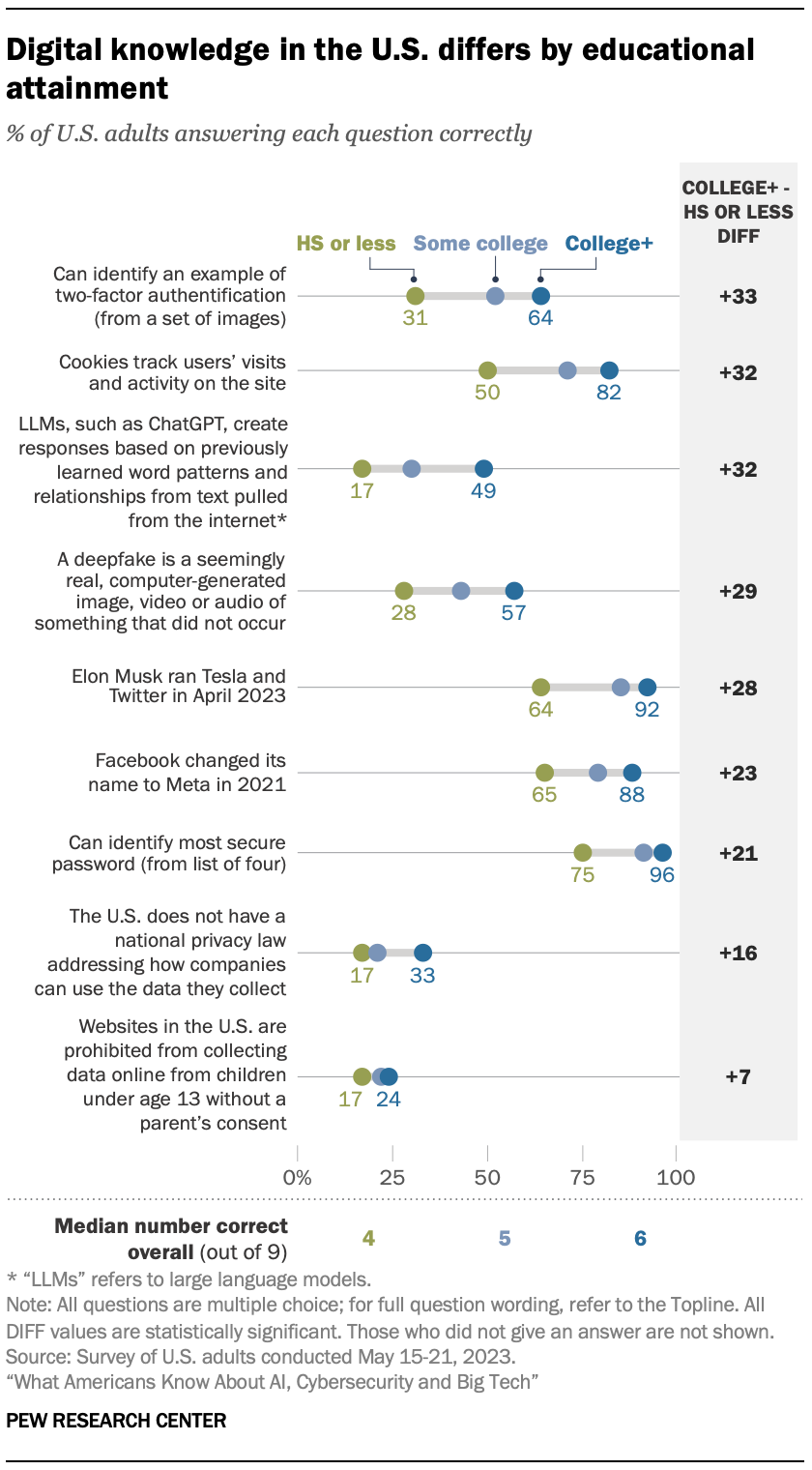
Americans’ digital knowledge differs widely by educational attainment.
Adults with a bachelor’s or advanced degree answer a median of six out of nine questions correctly. Those who have some college education answer a median of five questions accurately. And those with a high school diploma or less education correctly answer a median of four questions.
Educational differences appear on all nine questions asked in the survey.
For example, college graduates particularly stand out as more likely to know the answer to each of the following than those who have a high school education or less:
- 64% of college graduates can correctly identify an example of a two-factor authentication, compared with 31% of those with a high school diploma or less education.
- 82% of college graduates know that cookies track users’ visits and activity on websites. Half of Americans with a high school diploma or less education know this.
- 49% of college graduates know how large language models, like ChatGPT, create responses, compared with 17% of those with a high school diploma or less education.
- 57% of college graduates can correctly define what a deepfake is, compared with 28% of those with a high school diploma or less education.
While double-digit educational differences are still seen, majorities of U.S. adults – regardless of their formal educational attainment – know what companies Elon Musk was running in April 2023, that Facebook changed its name to Meta, and which password (of four listed) is most secure.
Educational differences are less pronounced when it comes to knowledge of federal legislation. For example, few Americans – regardless of education level – are familiar with the federal protections that are in place to safeguard children’s privacy online.
How Americans’ digital knowledge varies by age
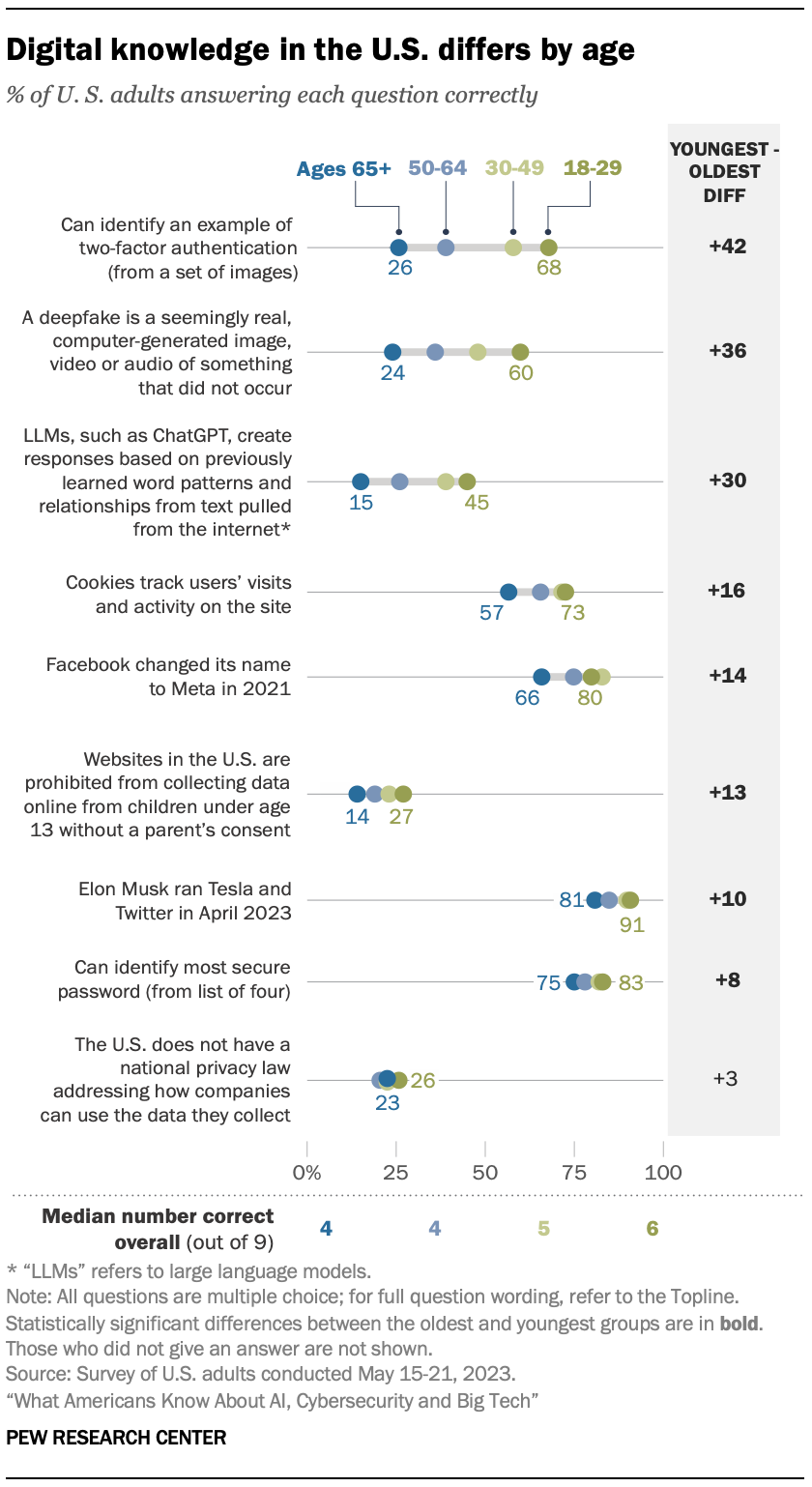
Age differences in Americans’ digital knowledge widely vary depending on the topic. The patterns seen across age groups are not always consistent, but adults under 50 generally fare better than those 50 and older.
Adults ages 18 to 29 answer a median of six questions correctly. That number drops to 5 among those ages 30 to 49 and to four among those ages 50 to 64 and ages 65 and older.
The most pronounced age differences appear when Americans are asked about two-factor authentication, deepfakes and large language models:
- 68% of adults under 30 can identify an example of two-factor authentication, compared with 26% of those ages 65 and older.
- 60% of Americans under 30 know what a deepfake is, compared with 24% of those 65 and older.
- 45% of those under 30 know how large language models work, compared with 15% of those ages 65 and older.
But these gaps are more modest on other questions. Similar shares of older and younger Americans know the U.S. does not have a comprehensive digital privacy law in place. And clear majorities across age groups can correctly identify an example of the most secure password and know Musk was running Tesla and Twitter in April 2023.




